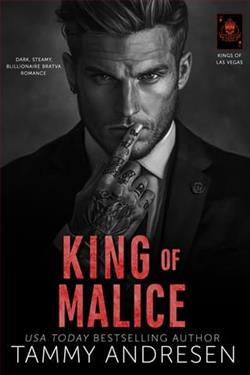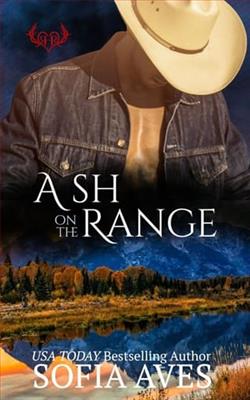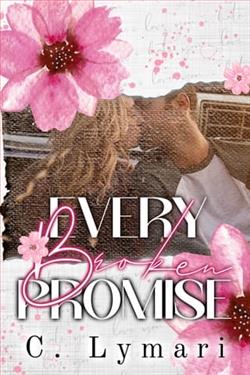Page 14 of The Road to Avalon
The idea that we could just up and run away and leave Dumnonia to Amhar erupted inside my heart and head. Yes. We could avoid Camlann by leaving, by running away and just being us, forever. The thought only lasted a moment. No. How wrong that would be to abandon our people. We weren’t just anybody and couldn’t please ourselves. We were a king and queen, and out there, on the hill and below it, and all across Dumnonia, were our people. We owed it to them to stay until the bitter end.
“What is it?” he asked. “Why the long face?”
I dredged up a smile and put my hand up to caress his cheek– freshly shaved that morning. “Nothing. Just someone walking over my grave.” I rubbed my thumb across his skin and let my fingers slide into his hair. “I, too, wish we could lie here in peace forever.”
He bent and his lips brushed mine in a featherlight kiss. “The world would never let us.”
Much the same as I’d concluded for myself, but I wanted to hang onto this moment, to never let it go.
My fingers tightened in his hair. “Love me,” I whispered. “Here, in the sun, away from the fortress. When there’s just us. No one to drag you away from me. No demands on your time.”
He kissed me again, more deeply this time. “I’m supposed to be looking at the hay…”
I slid my hand up under his shirt, letting my fingers trail across his skin. “I don’t care. Today is ours. Love me, Arthur.”
He did.
Let it always be like this.
*
The next daythe haymaking began. Arthur organized our men to take their scythes down the hill to work with the villagers. We’d been able to do this for a number of years, now, with the peace Arthur had brokered with the Saxons in the east still continuing, and every year we’d cut more hay than the one before. Along with more wheat and barley for bread and beer, this meant more animals could over-winter, which meant more youngstock in the spring, and more food for everyone. And of course, better fed, bigger horses.
Archfedd, who still slept with Maia in the little room beside ours that had been hers since childhood, came bouncing into our room first thing in the morning, eyes bright with excitement, to find Arthur already gone and me hurrying to dress. “Aren’t you ready yet? Maia has made the picnic and Reaghan’s already outside waiting with Seren.” She waved a hand in the air. “And the sun’s shining down on us like God’s smiling on our work.”
I fastened my ankle boots. Like Archfedd, I’d dressed in a simple short-sleeved tunic that only came halfway down my calves, and had girdled it with a plain leather belt– the same outfit as yesterday, which made me smile at the memory of what I’d got up to in it. No need to dress up for haymaking, even if you were a queen, and cool clothes were the order of the day.
I straightened and smiled. How pretty my daughter was. Arthur always said she took after me, but I’d quite forgotten what I looked like after so long without a decent mirror. I could see him clearly stamped in her, though– with her straight nose and loose-limbed walk, not to mention her dogged determination and outspokenness. Although perhaps he would have said they both came from me.
“I’m done,” I said and stood up. “Let’s be off then.” I picked up the bread and cold bacon Maia must have left me, and followed her out through her bedroom into the sunshine. Maia and Reaghan were waiting with little Seren, the pony who’d served Llacheu and then both my children well. Now well into her twenties, her pretty dapples had long gone, and her snowy white coat was flecked with those little brown patches of hair that so closely resembled freckles but had to be called fleabites. Her back sagged a little with age, but all she’d be expected to carry in her two panniers today would be our food and drink.
“The men’ve already gone,” Reaghan said, hopping from one foot to the other. “We’ll be late if we don’t get a move on.” She patted one of the panniers. “Mother made us mutton pies for our midday meal.” Coventina wouldn’t be coming, as it was now too far for her to walk. Old age, which she stood with stoicism, seemed to be galloping up on her.
With Maia leading Seren, we took the road to the north gates and ambled down the steep track toward the village. The already hot sun beat down on our backs, making me wonder if we should have worn our straw hats. Before us, the plain stretched away toward the line of complicit willows that marked the stream, and beyond that to the distant hump of the Tor at Ynys Witrin. Shreds of mist still clung to that hill like drapes of chiffon, despite the heat of the morning.
The courses of such drainage ditches as the local farmers had cut stained the landscape with the bright green of their lush grass, and in between them, the small square fields of our farms crowded together, marking the higher ground. The pale green of the hayfields stood ready for our men’s scythes; the nearest ones dotted with the tiny figures of men. And the fields of wheat, barley and oats rippled in the breeze like a gold-tinted green sea.
Other women from the fortress, some with their children on their hips or tagging behind, had joined us, heading to help their menfolk. The ant-like figures working in the hayfields grew larger. Soon we were walking along the narrow paths between the stone and earth walls, all bedecked with the blue of cornflowers, the red of campion and white of stitchwort, the aroma of the leafy wild garlic strong. These walls served only to keep out any wandering livestock rather than to delineate one man’s field from another’s.
The hay was already falling in fat swathes to the rhythmical swing of the men’s scythes, and the music of voices joined in song rose toward the blue sky, where larks circled, joining their bubbling cries to the men’s melody.
I never tired of the turn of the seasons in my chosen world. Despite the warfare and the battles, what really governed life was nature: the tilling of the soil in spring; the sowing of the seed; the haymaking with everyone lending a hand; early autumn’s harvesting; the bounty of the hedgerows; the birth of calves and lambs; the birth of children. With everything bound together, the whole thing worked like some machine of many cogs, contributing to a life of harmony broken only by the threat of danger from outside.
Our warriors worked stripped to the waist alongside the farmers, their voices uplifted in the songs of the earth, backs bronzing in the sun, sweat beading on their foreheads. Good, honest toil, a million miles from riding into battle.
We women didn’t have much to do this first day, but tomorrow we’d be forking over the rows of cut hay and fluffing them up so they could dry while the men cut more of it. If we didn’t make the hay ourselves, no one else would. Unlike in my old world, we couldn’t just go and buy it somewhere else. A single warhorse can eat a ton of hay over a winter, and we had a lot of horses.
We found Arthur and Merlin laboring in a field on the far side of the village with a dozen of our men, Llacheu and Cei amongst them. Having removed Seren’s panniers, we tethered her where she could graze and sat down on the grass to watch our men at work, a not unpleasant chore. None of them carried any extra weight– the life they led didn’t encourage that. Muscles rippled beneath sun-kissed skin, and although many of them were now over forty, they still moved with the ease of young men, accustomed to daily hard work.
We’d brought jars of cider, and after a while Arthur called a halt and the men all came to sit with us and the other wives. They smelled of sunshine and sweat and cut grass, a heady mix that always warmed my heart. The urge to lure Arthur back to the riverbank of yesterday was great.
The cider jar did the rounds. I’d spread a couple of thick blankets, and when he’d drunk his fill, Arthur flopped back onto mine, squinting up into the sky where a buzzard wheeled on a thermal. “I could be happy being a farmer,” he mused. “The rhythm of the seasons, the providing for my family, the new life springing every year.”
An echo of yesterday. Maybe he’d been thinking the same thing as me.
I lay down beside him, finding his hand. “A day like today makes me feel like that as well.” I kept my voice low– the next remark just for him. “A day like yesterday.”
For just an instant in time, again, we were ordinary people and not a king and his queen. The warmth drenched my body, and I let my eyes close, floating on an idea of just him and me and no worries ever again, just as I’d done the day before, wanting to capture that feeling and bottle it so I could take it out whenever I needed to relive it.















